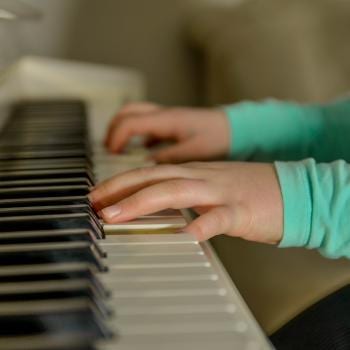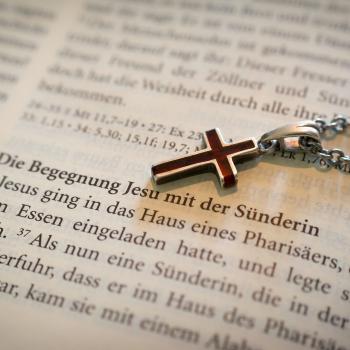Yesterday as Sally climbed into the car, she knocked over a can with flowers in it, something she’d brought home from school, and in the process spilled water on the seat. Sally began to fret about the water, but I didn’t have a towel or other rag in the car. Since we were about to head home home, I suggested that she sit on the wet spot, soaking up some of the water with her dress, and that she could change when we get home. Sally responded that the water was in a corner of the seat, so she couldn’t.
By this time I’d been out with the kids to the park and elsewhere an hour and a half, and we’d already had to go back to the park because Sally left her backpack there, and I was feeling overwhelmed and annoyed. So when Sally followed her fretting about the water up by saying she couldn’t soak it up with her dress, I was just done.
“Fine,” I said. “But if the car rots—”
And there I stopped myself. I’d been about to say “if the car rots, it’s your fault!” But then the entire point of such a statement would be to make Sally feel bad—to use guilt and blame to manipulate her feelings. This is the kind of thing I’m trying very hard not to do! Sally already felt bad that she had spilled the water and was already worried about the car. Why make her feel worse? Why wield her own emotions and feelings as a weapon against her? That’s really not okay.
So when I actually finished the sentence, it looked like this:
“Fine. But if the car rots—we’ll deal with it.”
Sally looked relieved as she buckled her seatbelt. “That’s right mom,” she said cheerfully. “We’ll deal with it!” And somehow, just like that, the mood shifted from antagonistic to cooperative.
Giving up corporal punishment was easy. It’s giving up the rest—the myriad ways parents can be punitive and negative in their parenting—that is difficult. Not physically abusing a child is so much easier than not emotionally abusing them.
While I was at the park, before Sally left her backpack and then spilled the water, I observed an interaction between a father and son. My own son Bobby was swinging, as I gave him pushes, when a little boy of about two came up and wanted to use the swing. His father tried to call him away, telling him he should come play on the playground equipment until the swing was open. The boy stepped back and stood by the swings. His father called to him again, from about fifteen feet away, but the boy didn’t move.
“I’m waiting!” the boy explained.
I could hear the boy’s words because he was standing only a few feet away, but his father could not. Instead, all he saw was a boy who wasn’t doing what he said. The father was growing increasingly upset and agitated, and began raise his voice.
“Get over here and play like I told you to!” he yelled at his son.
I winced. Who would want to go play when told to do so in such a tone?
The boy’s father did not take the time to come over to his son, get down on his level, and have a conversation with him. If he had, he would have known that the boy understood he would have to wait his turn for the swing, and simply wanted to stand by the swings and wait patiently. If the father, for whatever reason, had still wanted the boy to go play on the playground equipment, he could have explained that to him, and they could have talked about it, and the boy probably would have listened. But he didn’t do any of this. Instead, he yelled at his son in the middle of a park outing.
The thing is, on some level I understood. The father was there alone, without the backup of a parenting partner, and he had a baby under his arm. I used to go to the park on my own with Sally and Bobby when Bobby was a baby too, and it could be very trying. The boy may have spent the drive to the park fretting about something or nagging his father for something, or the father may have had short nerves for other reasons—he may have had a hard day at work, or perhaps things were tight financially.
I know how easy it is to snap, to become frustrated and angry. Raising little people is hard work, and just being an adult in and of itself can be stressful. I’ve raised my voice on occasion too. But just because something is understandable does not make it justified. As parents, we need to call ourselves to extremely high standards, because we hold our children’s hearts in our hands.
We often talk about parenting as though there are abusive parents and good parents—a dichotomy of sorts—but real life isn’t this simple. It’s a continuum. Some abusive parents are more abusive than others, and plenty of parents we wouldn’t term abusive are sometimes unkind to their children or parent in suboptimal ways. For some, this dichotomy may make it easier for bad parenting to go unchecked, because being self-critical of our own parenting can be difficult when the only parenting categories out there are “good” and “abusive.”
In our society today there’s also much more recognition of the problem of physical abuse than there is of the problem of emotional abuse. Emotional abuse can be horrific. I know people whose parents never laid a hand to them who were nevertheless horribly abused. In fact, in my experience, the effects of emotional abuse can last longer and be more severe than the effects of physical abuse. Even parents who are not emotionally abusive overall may do things on the emotional abuse checklist at some point without even realizing it. We are in serious need of awareness raising regarding emotional abuse and children.
I find it helpful to think in terms of practicing healthy relationship skills with my children. Would I have snapped at a friend if she spilled some water in my car, angrily telling her that if the car rots, it’s her fault? No. Would that father in the park have yelled at a friend of his for not coming when called, rather than walking over to him to clarify the plan? No. Sure, adults and children are at different developmental levels and different developmental needs, I get that, but I think remembering that a friend could walk away but your child can’t is incredibly important. We need to get serious about how we treat our children.
While I understood the frustration the father in the park felt—as perhaps will anyone who has been to the park with an infant and toddler—I felt strongly for his son, who was trying to communicate and in response being ignored and yelled at. In the car with Sally, I was only able to stop myself and turn the conversation around because I paused for a moment to step out of my frustration and put myself in my daughter’s shoes. As parents, we need to do that more often.
Parental frustration should be a prompt to be careful about our actions toward our children, not an excuse for bad behavior. A boss taking out his frustration at his impending divorce and the collapse of his home life on his employees may be understandable, but no one would see it as justified. I think we as a society make more allowances for bad parenting than we realize. Because of their dependence—and because they cannot simply walk away—children are incredibly vulnerable, a sort of captive audience. We should see that as a reason to be only more careful about how we treat them.
If you’re a parent, there are probably times you’ve snapped at your children when you shouldn’t have, or times you vented your own frustrations onto your children. I know I have! Some mothers, especially those raised in abusive or dysfunctional families, beat themselves up over their mistakes and wonder whether they are “bad” mothers (there’s that dichotomy again!) or worry that they are becoming their parents. Other mothers glibly point out that “no parent is perfect” and then go on their merry way without a further thought or any intent to do better in the future.
I would call for a different response, one where past mistakes lead not to dwelling on guilt but rather to resolve to do better in the future, and where mistakes aren’t glibly justified as acceptable rather than merely understandable. We may not be able to control actions we took in the past, but we can control our actions in the present. We can also apologize when needed. Our children don’t need to think we’re perfect. There’s no facade we need to uphold—they can see right through it. Being honest and real with our children is important.
Parenting in a healthy and positive way means so much more than just not hitting your child. It’s not something I could achieve immediately or automatically by giving up spanking, though I had once hoped it would be. Instead it’s something I have to keep doing, over and over, every day. It takes intent and commitment, and it sometimes means stopping myself in mid-sentence or pausing to take a step back from a situation and reset my approach. But when my daughter throws her arms around my neck and declares “I love you, mommy,” when she is unafraid to be open with me, when she is comfortable in who she is and in her relationship with me, I know that it is so, so worth it.













